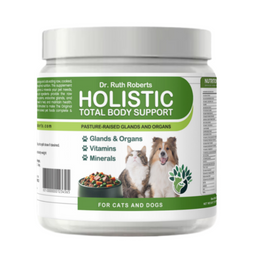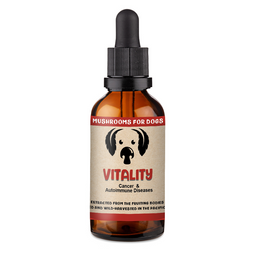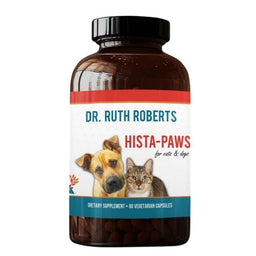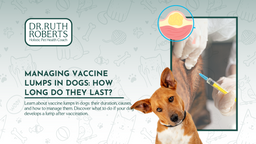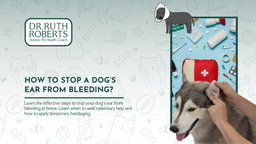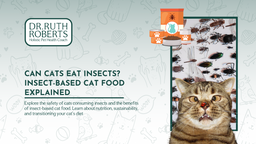Cats, like all pets, require a well-rounded diet to maintain their health and wellness. While a balanced commercial diet often provides the basic nutritional foundation, it's not always sufficient to meet every cat's unique needs. This is where supplements come into play, offering additional nutrients to enhance your cat's diet and address specific health concerns. In this blog, we'll explore why supplements are essential for cats and delve into various types that can benefit your feline companion, from whole body support to specialized needs for skin, coat, joint, cognitive, and immune health
Why Do Cats Needs Supplements
Cats may need dietary supplements for several reasons, even when they are fed a balanced commercial diet. Here's why supplements can be important for cats:
- Nutritional Gaps in Commercial Food: While many commercial cat foods are formulated to be complete and balanced, they might not meet the specific needs of every cat. Supplements can help fill any nutritional gaps.
- Aging and Health Conditions: As cats age, their nutritional requirements can change. Senior cats, for example, might benefit from joint supplements like glucosamine and chondroitin. Cats with specific health conditions, like kidney disease or digestive issues, might also need supplements tailored to their needs.
- Quality of Ingredients: The nutrient content in commercial pet foods can vary based on the quality of ingredients and processing methods. Essential nutrients can be lost during the manufacturing process, necessitating supplementation.
- Support for Specific Functions: Certain supplements support specific bodily functions. For instance, omega-3 fatty acids are important for skin and coat health, and probiotics can aid in maintaining a healthy gut flora.
- Dietary Restrictions: Cats on limited-ingredient diets due to allergies or sensitivities might not receive all the necessary nutrients and may benefit from supplements.
- Taurine Deficiency: Taurine is an essential amino acid for cats and must be obtained through their diet. Some cats might require additional taurine supplementation, especially if they eat home-cooked meals or have certain health conditions.
- Preventive Health: Supplements can play a role in preventive health care. Antioxidants, for instance, help combat free radical damage and support the immune system.
- Indoor Lifestyle: Indoor cats may lack exposure to natural light and activities that outdoor cats have, which can impact their physical and mental health. Supplements can help address these unique challenges.
- Improved Absorption in Older Cats: As cats age, their ability to absorb nutrients from food can decrease. Supplements can ensure they receive the necessary vitamins and minerals in a more easily absorbable form.
- Environmental and Stress Factors: External factors like pollution, stress, or changes in routine can impact a cat's health and dietary needs.
Essential Supplements for Cats
WHOLE BODY SUPPORT
Whole body supplements are designed to provide a broad spectrum of nutrients that support various bodily functions, including immune system health, digestive wellness, joint and bone health, and skin and coat condition. These supplements can be particularly beneficial for indoor cats, aging cats, or those with specific health issues, ensuring they get all the essential vitamins, minerals, and other nutrients needed for optimal health.

- Glandular Supplements: These supplements provide essential nutrients that regular diets might miss, supporting cats’ endocrine systems.
- Standard Process Veterinary Line: A trusted source for high-quality supplements like Canine Enteric support and Feline renal support.
- B Vitamins (including B12, Niacin): Important for various metabolic processes and overall health. Necessary for cats with certain health conditions or dietary restrictions.
- Holistic Total Body Support: Multivitamin with glandular extract
SKIN AND COAT HEALTH
Cats need good skin and coat health as it's a vital indicator of their overall well-being. A healthy coat and skin not only enhance their appearance but also serve essential functions, such as providing protection from environmental factors, aiding in temperature regulation, and serving as a barrier against infections and parasites. A glossy, smooth coat and healthy skin are often signs of proper nutrition and health. Conversely, issues like dullness, excessive shedding, flakiness, or irritation can signal nutritional deficiencies, allergies, or underlying health problems. Therefore, supporting skin and coat health with supplements is crucial for their comfort, protection, and overall health.
- Fish Oil: Rich in Omega-3, it's excellent for skin and joint health.
- Plant Extracts: Quercetin and Nettles support the immune system and inflammatory response.
JOINT AND HIP SUPPORT FOR SENIOR CATS

As cats age, they often face a decline in joint health, leading to conditions such as arthritis, which can cause discomfort and reduced mobility. Supplements for joint and hip support, typically containing ingredients like glucosamine and chondroitin, are crucial for older cats. These compounds help maintain healthy cartilage and joint function, providing essential building blocks for joint repair and lubrication. This support is vital because, with age, the body's natural ability to repair joint tissues diminishes, and the wear and tear of years can take a toll. By incorporating these supplements into an older cat's diet, pet parents can help alleviate joint pain, improve mobility, and enhance their cat's overall quality of life in their senior years.
- Glucosamine and Chondroitin: These supplements aid in joint health and can ease arthritis symptoms.
- Arthri-Pawz: Provides nutritional support for joints with glucosamine, Boswellia and turmeric extract.
COGNITIVE SUPPORT FOR SENIOR CATS
As cats age, they may experience a decline in cognitive function, similar to dementia in humans, known as Cognitive Dysfunction Syndrome (CDS). This condition can lead to disorientation, altered interactions, sleep disturbances, and changes in activity levels. Supplements for cognitive support in senior cats are designed to address these issues. They often contain antioxidants like vitamins E and C, omega-3 fatty acids, and other specific nutrients that help protect and support brain health. These supplements aim to improve brain function, reduce symptoms of cognitive decline, and enhance overall quality of life in aging felines.
- PEMF Therapy: Helps in pain and inflammation relief.
- Antioxidants: Vitamins E and C support brain health.
IMMUNE BOOSTERS
Cats may require immune-boosting supplements due to a variety of factors that can compromise their immune system. These include aging, chronic health conditions, stress, environmental pollutants, and even the limitations of commercially prepared cat foods, which might not always provide all the necessary nutrients for optimal immune function. Immune boosters, such as antioxidants, omega-3 fatty acids, and specific vitamins and minerals, help strengthen the cat's natural defense mechanisms against diseases and infections. They can be particularly beneficial for senior cats, cats with weakened immune systems, or those recovering from illness
- Medicinal Mushrooms: Sources of beta-glucans, supporting immune function.
- Myco-Pawz: A blend of mushroom extracts for immune health.
ANTI-INFLAMMATION
Inflammation can lead to discomfort, pain, and a decrease in quality of life. Anti-inflammatory supplements, like Omega-3 fatty acids (found in fish oil), can help reduce this inflammation, providing relief from symptoms and improving overall wellbeing. Turmeric supplement can also be beneficial as it contains curcumin, a compound that helps reduce inflammation in conditions like arthritis, skin allergies, or gastrointestinal disorders. This can lead to improved comfort and mobility, enhancing overall quality of life for cats, especially those that are older or suffer from chronic health issues. Integrating turmeric into a cat's diet can aid in managing inflammation-related symptoms, promoting healthier skin, joints, and organ function. These supplements can be especially beneficial for senior cats or those with chronic conditions where inflammation is a significant concern.
- Omega-3 Fatty Acids: Help reduce inflammation and promote joint health.
- Turmeric: Offers anti-inflammatory properties when used in moderation.
PROBIOTICS FOR DIGESTIVE HEALTH
Cats require probiotics for digestive health because these beneficial bacteria play a crucial role in maintaining a healthy gut microbiome. A balanced gut flora aids in proper digestion, nutrient absorption, and the synthesis of essential vitamins. Probiotics also support the immune system, as a significant portion of a cat's immune function is located in the gastrointestinal tract. In addition, they help in combating harmful bacteria, reducing the risk of gastrointestinal issues such as diarrhea, constipation, and irritable bowel syndrome. This is particularly important for cats recovering from illnesses, undergoing antibiotic treatments, or dealing with stress, all of which can disrupt the natural balance of gut bacteria.
- Fidospore: A probiotic supplement promoting digestive health.
KIDNEY DISEASE
Cats need specialized attention for kidney disease because it's a common and often progressive condition in felines, especially as they age. Cats with kidney disease often require supplements because their kidneys are no longer able to efficiently filter and eliminate waste products from the blood, leading to a buildup of toxins in the body. Supplements can help support kidney function by providing essential nutrients that are easier for the weakened kidneys to process. They often include antioxidants, omega-3 fatty acids, and specific vitamins to reduce oxidative stress, inflammation, and support overall kidney health. Additionally, supplements may contain compounds that help balance electrolytes and manage blood pressure, both of which are crucial for cats with kidney disease.
- Omega-3 Fatty Acids: Support kidney function and reduce inflammation in kidney disease.
- Feline Renal Support: Supports kidney function and urinary system health.
HEART HEALTH
Cats require supplements for heart health primarily because certain essential nutrients critical for cardiac function are not always sufficiently present in cat foods. One key nutrient is taurine, an amino acid that cats cannot synthesize in adequate amounts on their own. Taurine deficiency can lead to serious cardiac problems, including dilated cardiomyopathy, a condition where the heart becomes enlarged and cannot pump blood effectively. Omega-3 fatty acids, found in fish oil supplements, are also important for heart health, as they help to reduce inflammation and can manage heart rhythm abnormalities. Given the specialized dietary needs of cats and the potential gaps in commercial diets, supplements can play a crucial role in maintaining a healthy feline heart, especially as cats age or if they have pre-existing heart conditions.
- Taurine: Vital for heart muscle function and preventing heart diseases in cats.
- Omega-3 Fatty Acids: Reduce inflammation and support healthy cardiac function
EYE HEALTH
Cats require supplements for eye health to ensure they receive all the necessary nutrients that support optimal vision, which might not be adequately provided by their regular diet. Essential nutrients like taurine, vitamin A, and omega-3 fatty acids are crucial for maintaining healthy eyes and preventing degenerative eye conditions. Taurine, an amino acid exclusively found in animal-based proteins, is particularly vital as it plays a significant role in retinal health. Deficiencies in these nutrients can lead to vision problems and eye diseases. Since cats are obligate carnivores and have specific dietary needs, supplements can help bridge any gaps, ensuring their eyes remain healthy throughout their lifespan. This is especially important for cats with dietary restrictions, indoor lifestyles, or those prone to eye health issues.
- Taurine: Crucial for eye health, prevents retinal degeneration.
- Vitamin A: Essential for proper eye function and vision health.
- Omega-3 Fatty Acids: Support retinal health and prevent dry eye conditions.
REPRODUCTIVE HEALTH
Cats require specific nutrients to maintain optimal reproductive health, particularly when they are breeding. Essential vitamins and minerals, like Vitamin E and Omega-3 fatty acids, play a crucial role in hormonal balance and reproductive function. These nutrients support various aspects of reproductive health, such as enhancing the quality of sperm in males and ensuring proper fetal development and successful pregnancy in females. Additionally, specific amino acids like taurine are vital for fetal development and overall reproductive health. Since regular cat food may not always provide sufficient quantities of these vital nutrients, especially for cats in breeding programs, supplementation can help ensure they receive everything needed for healthy reproduction.
- Omega-3 Fatty Acids: Support fetal brain development and reproductive health.
- Vitamin E: Essential for reproductive cell protection and healthy pregnancies.
- Taurine: Important for reproduction and fetal development.
Conclusion
Understanding and addressing the nutritional needs of cats through supplements is crucial for their long-term health and well-being. However, it's important to note that if you're already providing your cats with a balanced and complete diet, additional supplements may not be necessary. A well-formulated commercial cat food often contains the essential nutrients required for the average cat's health. Supplements become particularly valuable in filling nutritional gaps for specific circumstances, such as aging cats, those with health conditions, or cats with an indoor lifestyle. They can offer targeted support for areas like skin and coat health, joint support in older cats, cognitive function, immune system boosting, anti-inflammatory needs, digestive health, and support for kidney, heart, eye, and reproductive health. Always consult with a veterinarian or a holistic pet health coach to ensure that any supplements you consider are suitable and beneficial for your feline friend.



